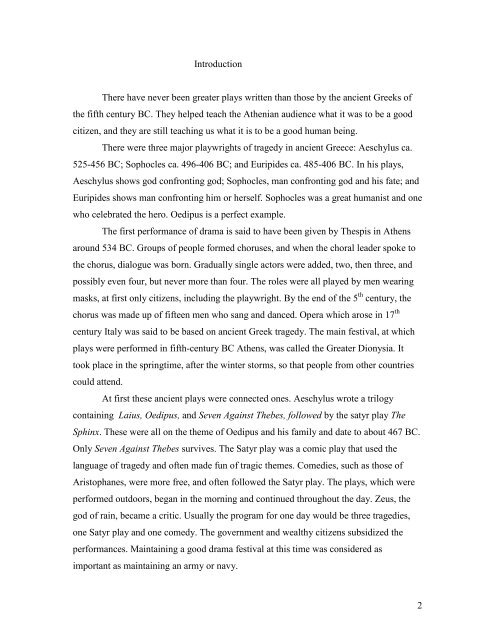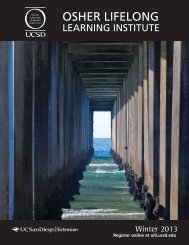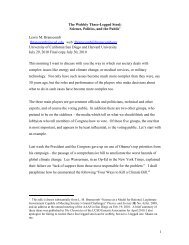1 Sophocles' Oedipus Tyrannus Introduced and Translated by ...
1 Sophocles' Oedipus Tyrannus Introduced and Translated by ...
1 Sophocles' Oedipus Tyrannus Introduced and Translated by ...
Create successful ePaper yourself
Turn your PDF publications into a flip-book with our unique Google optimized e-Paper software.
Introduction<br />
There have never been greater plays written than those <strong>by</strong> the ancient Greeks of<br />
the fifth century BC. They helped teach the Athenian audience what it was to be a good<br />
citizen, <strong>and</strong> they are still teaching us what it is to be a good human being.<br />
There were three major playwrights of tragedy in ancient Greece: Aeschylus ca.<br />
525-456 BC; Sophocles ca. 496-406 BC; <strong>and</strong> Euripides ca. 485-406 BC. In his plays,<br />
Aeschylus shows god confronting god; Sophocles, man confronting god <strong>and</strong> his fate; <strong>and</strong><br />
Euripides shows man confronting him or herself. Sophocles was a great humanist <strong>and</strong> one<br />
who celebrated the hero. <strong>Oedipus</strong> is a perfect example.<br />
The first performance of drama is said to have been given <strong>by</strong> Thespis in Athens<br />
around 534 BC. Groups of people formed choruses, <strong>and</strong> when the choral leader spoke to<br />
the chorus, dialogue was born. Gradually single actors were added, two, then three, <strong>and</strong><br />
possibly even four, but never more than four. The roles were all played <strong>by</strong> men wearing<br />
masks, at first only citizens, including the playwright. By the end of the 5 th century, the<br />
chorus was made up of fifteen men who sang <strong>and</strong> danced. Opera which arose in 17 th<br />
century Italy was said to be based on ancient Greek tragedy. The main festival, at which<br />
plays were performed in fifth-century BC Athens, was called the Greater Dionysia. It<br />
took place in the springtime, after the winter storms, so that people from other countries<br />
could attend.<br />
At first these ancient plays were connected ones. Aeschylus wrote a trilogy<br />
containing Laius, <strong>Oedipus</strong>, <strong>and</strong> Seven Against Thebes, followed <strong>by</strong> the satyr play The<br />
Sphinx. These were all on the theme of <strong>Oedipus</strong> <strong>and</strong> his family <strong>and</strong> date to about 467 BC.<br />
Only Seven Against Thebes survives. The Satyr play was a comic play that used the<br />
language of tragedy <strong>and</strong> often made fun of tragic themes. Comedies, such as those of<br />
Aristophanes, were more free, <strong>and</strong> often followed the Satyr play. The plays, which were<br />
performed outdoors, began in the morning <strong>and</strong> continued throughout the day. Zeus, the<br />
god of rain, became a critic. Usually the program for one day would be three tragedies,<br />
one Satyr play <strong>and</strong> one comedy. The government <strong>and</strong> wealthy citizens subsidized the<br />
performances. Maintaining a good drama festival at this time was considered as<br />
important as maintaining an army or navy.<br />
2









